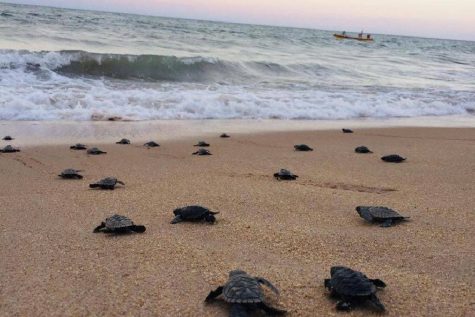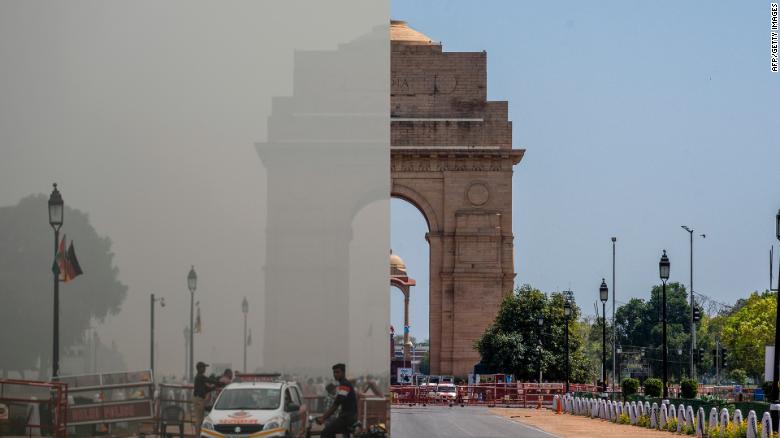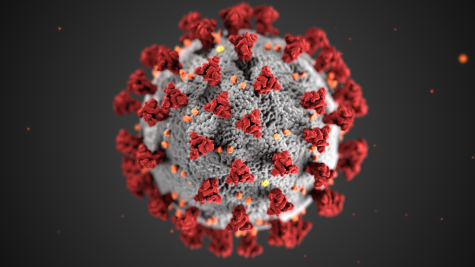Coronavirus Lockdowns Send Pollution Plummeting and are Benefiting Animals
May 6, 2020
This is a crazy time for us right now. A pandemic has hit us hard and has caused thousands of deaths worldwide. Now we have to stay inside our homes and social distance. It’s easy to get caught up in the negative side of things, but surprisingly there are some positive impacts happening right now as well. Traffic-free roads, plane-free skies, and widespread businesses closing have made the planet a beneficiary of the Coronavirus pandemic. Since the world is on lockdown, it’s giving Mother Earth time to revive itself and take a breather. Now that people are inside their homes daily, it gives them nothing to do, they are producing less trash, less pollution, and less smog. People can’t pollute the Earth to the extent we were, because they’re not going outside. These freedoms are being seen in all walks of life. Animals are also receiving more freedom as well, due to people not interfering with their habitats, animals are returning to the valleys of Yosemite and beyond. Skies are clearing, and with few to no cars on the road, and factories closed they are staying that way. According to Rob Picheta from CNN Travel, “People in the northern Indian state of Punjab are reacting with awe at the sight of the Himalayan mountain range, which is now visible from more than 100 miles away due to the reduction in air pollution caused by the country’s Coronavirus lockdown.” The people of India in that region haven’t seen the peaks of the Himalayas for decades. Professor Manjit Kang said, “For the first time in almost 30 years (I) could clearly see the Himalayas due to India’s lockdown clearing air pollution. Just amazing.” The action of shutting down industries, the lack of driving cars, and flights being canceled are all what’s making that possible. India’s Central Control Board found that in Delhi, PM10 air pollution levels went up to a 44% reduction on the first day of restrictions. For those of you who are unaware of what PM10 (aka fine particles) is, they are particles with a diameter of 10 micrometers . India isn’t the only country that is benefiting from the lockdowns. In LA, California, the usually smog-consisted area had its longest stretch of “good” air quality since at least 1995, says the U.S. Environmental Protection Agency. Dr. Yifang Zhu, director of the Centre For Clean Air, and her team at UCLA’s Institute of the Environment & Sustainability added that there has been 20% gain in healthy air quality in Southern California. It has also been found that there are statewide traffic reductions of 80%, since everyone is on lockdown. As a matter of fact, on March 18, rush-hour traffic was moving 71 percent faster than usual. But, we have to keep in mind that this is only happening because the world is on lockdown. When we’re no longer on lockdown will the world go back to being dangerously polluted and chaotic?
Not only are the lockdowns causing less pollution, and making the Himalayan Mountains more visible,

Hawksbill sea turtle hatchlings crawl toward the ocean on Janga Beach in Paulista, Brazil, on March 22, 2020.
but they’re giving endangered sea turtles an advantage. Endangered sea turtles such as the Olive Ridley sea turtles and the Hawksbill sea turtles are thriving in the deserted beaches and are nesting in peace without having to worry about their normal predators (humans). The only people who were there to see it in front of their eyes were the Wildlife officials, according to a news release from the city. The Hawksbill sea turtle hatchlings were seen making their way into the Atlantic waves on Janga Beach in Paulista, Brazil, on March 22, 2020. About 97 Hawksbill sea turtles hatched. The Olive Ridley sea turtles laid their eggs in the marine sanctuary in India’s eastern state of Odisha from March 14 to 21, 2020. The coast of Odisha is one of the largest nesting sites for the Olive Ridley, but due to predators, survival rates can be as low as two per 1,000 hatchlings. The turtles are endangered because they’re killed for their eggs, meat, skin, and shells. But, since we’re on lockdown worldwide, they’re not being killed. Dr. Ashley Jacob posted a tweet that said, “Thousands of olive ridley sea turtles nesting on the beaches of Odisha. Their normal predators (humans) are in quarantine. This season, their numbers will explode in the oceans. There is a silver lining in this dark cloud after all.” That’s a nice and optimistic tweet for such a dark and crazy time.
With so much despair in our world, these bright moments need to be healed! Yes, this is a pandemic that is to be taken seriously, but during these times you have to keep your head up and take it one day at a time. As you take precautions, don’t forget to do things that make you happy and healthy. And remember, our world will be more healthy for your sacrifices during this difficult time.












